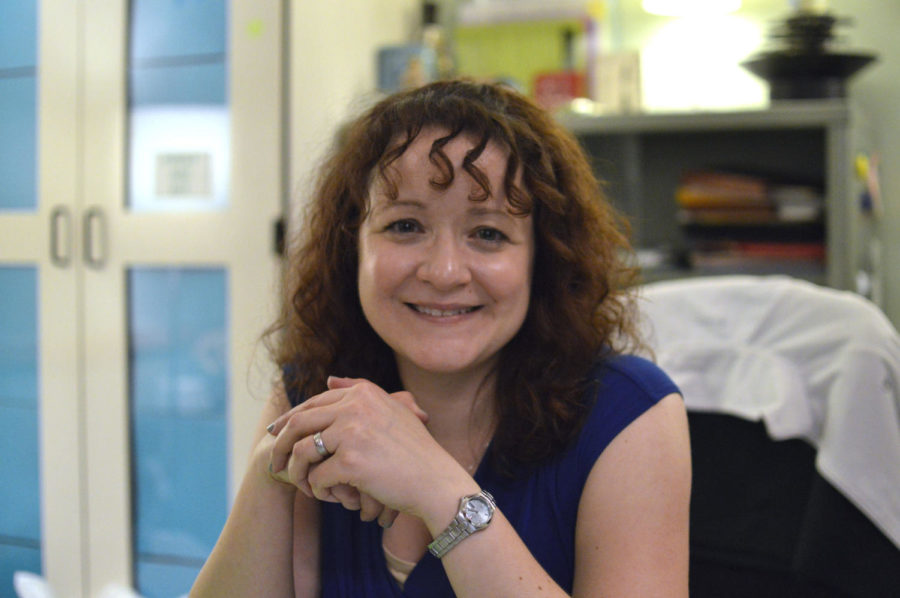Innovative teaching nets ISU professor a national award
Stacey Weber-Fève, associate French professor, poses for a portrait inside her office at Pearson Hall last Thursday.
October 12, 2015
Walking into one of Stacey Weber-Fève’s tests for her FRNCH 304 class, “French for Business and Professions,” might not be what you expect.
Instead of students filling out Scantron sheets, they are hosting a booth at the French Open House and explaining what they know. Tests like this are typical in Weber-Fève’s curriculum and have recently resulted in her receiving a national award.
Weber-Fève, associate professor of French, received word that she will be the recipient of the Nelson Brooks Award for Excellence in the Teaching of Culture. This annual award is given to one foreign language professor in the United States.
The award recognizes teaching of culture and is presented by the American Council on the Teaching of Foreign Languages.
“It is very humbling,” Weber-Fève said about winning her award. “The previous people who have won it I really admire. I would consider them some of the most excellent instructors in foreign languages.”
When deciding on the winner of this award, judges look at the impact the professor has in the classroom, the classes’ curriculum and how many students are affected.
“It’s a recognition of some of the innovations I’ve brought to the program here at Iowa State and some of the curriculum I’ve built,” Weber-Fève said on why she feels the judges chose her.
Weber-Fève also credits her “21st-century approaches” to her accolade. She has several approaches, such as her use of technology. For example, she spent a year researching face-to-face simulation and has now added that to her online classes instead of recording herself lecture.
Another new innovation Weber-Fève has tested and used in her classes is different approaches to testing. Rather than having her students memorize everything she discusses in class and take a written or online test, she has them apply their learning through real-life situations such as presentations.
“Because it’s much more engaging than taking an exam, I think it has a very positive impact on the students,” Weber-Fève said. “My hope is that through such approaches like this students see the ‘real-world’ applicability of what they’re learning in the classroom.”
Weber-Fève isn’t wrong about her students liking the new ways of teaching. The overall feeling about her and her methods was positive from her class. Multiple students presenting at the French Open House commented on how easy she is to speak with and how her teaching style is different than other professors.
Beate Schmittmann, dean of the College of Liberal Arts and Sciences, agrees with the students.
“[Weber-Fève] is a positive person and an inspiration,” Schmittmann said. “Her students have certainly learned to speak but also learned to reflect on their own cultures because of her classes.”
The college has been impressed with Weber-Fève since she has worked at Iowa State. Administrators believe she deserves this award based on her technological advances.
“For example, in her French 101 class, she has students do video dubbing. She originated this, and now even other professors use this method,” Schmittmann said.
The method involves students finding a one- to two-minute video in English, and then the students translate it into French. They then rip the audio and convert it into French.
“This makes the students have to get not only the language right but the cultural aspect right as well,” Schmittmann said.
Weber-Fève has accomplished much in her career so far, but she is not close to slowing down anytime soon.
“I have a first-year textbook coming out in January 2016, and a second-year textbook coming out in January 2017,” she said. “I’m starting a new book project on my film scholarship looking at comedy in French cinema with comedy and gender discourse, and [I’m] continuing to develop new courses and improve on my teaching.”
With her success, it may seem as though Weber-Fève has always been a natural at teaching.
“What has influenced my teaching the most has been actually researching how to teach,” Weber-Fève said. “Learning from my mistakes is the next thing that has influenced my teaching.”
Weber-Fève’s style of teaching has come from years of research as well as many trials and errors. Her advice for students comes from her experience.
“If you have an interest, try it. The more ideas you have, the more different kinds of experiences you have in the classroom …,” Weber-Fève said. “It’s good to have a plan, but look for those moments that are different than what you think you want to do. It might lead to a new discovery.”
Trying new methods over the years has led Weber-Fève to her success. She has spent years of expressing her knowledge face to face instead of on paper, and she is reaping the benefits.
Weber-Fève will receive her award in November at the ACTFL Annual Convention Awards Ceremony in San Diego.

















